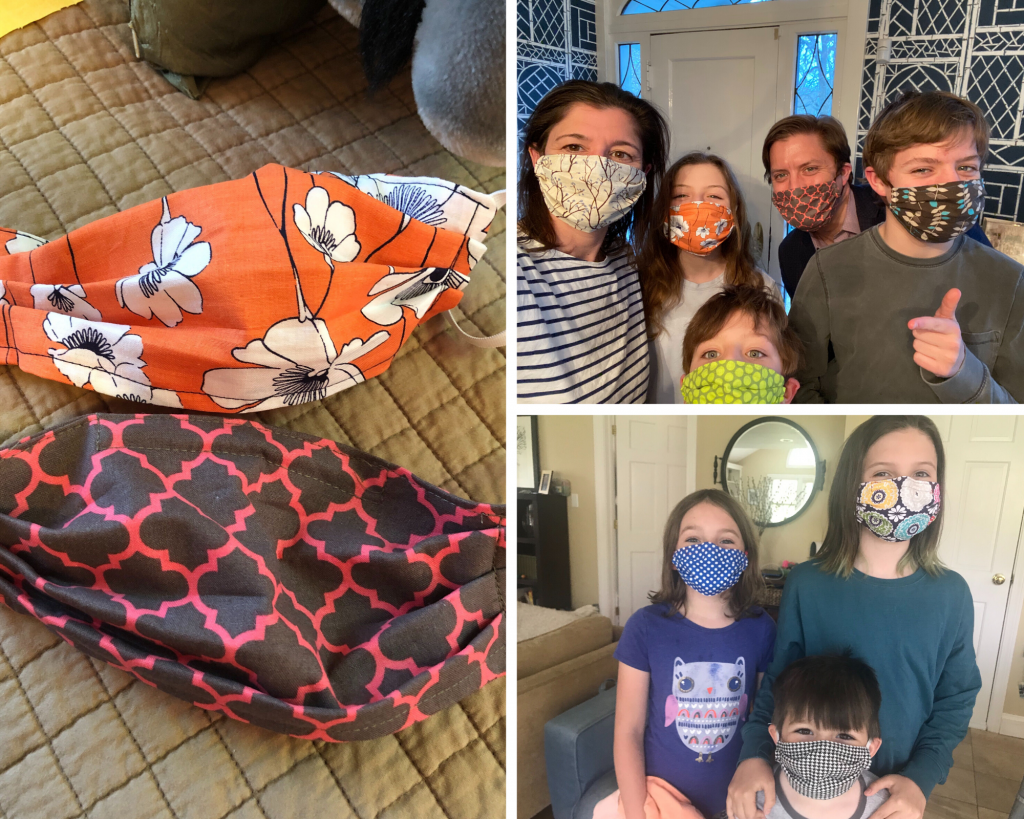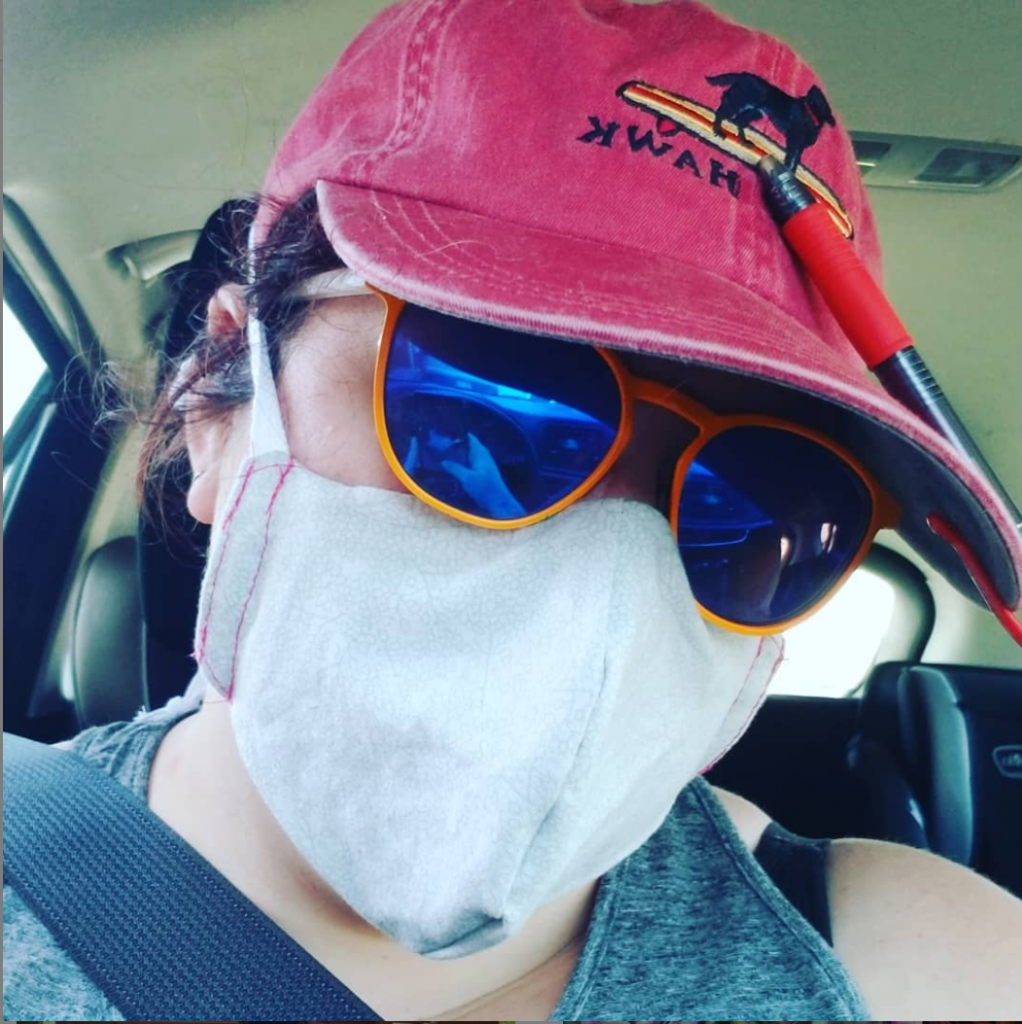
When COVID-19 cases began to appear across the country, many RENCI employees felt a call to action. While several took it upon themselves to develop new data science technologies or to adapt existing ones to process COVID-19 data, others have contributed to communities in need by creating face masks, assisting food banks, connecting researchers to projects, and supporting foster youth.
Creating Face Masks
Like many across the nation, some RENCI employees have started sewing face masks to donate to medical workers, neighbors, and people in need.
Jeffrey Tilson, senior research scientist, began making masks for his neighbors in late January. Tilson and his wife currently produce 20 masks each week, and plan to expand their operation outside of their neighborhood soon.
“I hope that by the time we scale our project up, we will not require masks anymore,” said Tilson.
Senior Project Manager Sarah Davis was looking for a way to help, and creating masks seemed to be an efficient choice based on her sewing skills and the supplies she had at home. She and her mother have set up an assembly line where her mother cuts fabric and Davis sews the masks. They started making masks solely for family and friends -especially for those with a high risk of contracting COVID-19) – but they have since added prisoners, nursing home residents, and nurses to their list of recipients.
“Our inspiration to give to UNC Rockingham Rehabilitation and Nursing Care Center was actually an accident,” said Davis. “I intended to take masks to somewhere in Durham but accidentally texted someone in Eden, N.C. The nurse who responded was so appreciative that we decided that would be where we would send our masks. It’s important to remember this isn’t a city problem or a neighborhood problem – every town is going to be affected.”
Davis urges people to find a small way they can help based on their skills and availability.
“Not everyone has a sewing machine, a 10-year supply of fabric scraps, and an unopened package of pipe cleaners on hand,” said Davis. “But it’s great to ask what tiny thing you can do to make life a bit better for someone else.”

Hannah Hiles, research project manager, was originally contacted by her friends and family with requests to create masks for health teams at rural hospitals. With the help of a friend who works as a pharmacy manager at UNC-Chapel Hill, Hiles settled on a double-layered mask pattern with a pocket sewn in that allows the mask-wearer to add a filter, and began to produce them in bulk.
She encourages those who want to help to use any and all skills at their disposal. According to Hiles, if you have a 3-D printer and want to contribute to face mask assistance, there is a high demand for Ear Saver Strap Extensions that can help reduce strain on healthcare practitioners’ ears.
Hiles has also donated her time to the state and national chapters of Mask Warriors, an organization that collects data from mask seekers and connects them to mask makers. She serves as an organizer to make sure the right kinds of masks get distributed to the right people.
Assisting Food Banks
Davis and Hiles have also worked to assist food banks in their areas.
“I volunteered at the Food Bank for Central & Eastern NC for an afternoon but quickly realized what they needed was monetary donations much more than my time,” said Davis.
Hiles’ story is a little different. Her family “adopted” the milk shelf of their neighborhood food bank a few months ago. Their responsibility as milk sponsors is to keep the shelf full of Ultra-High Temperature (UHT) milk.
“Many non-perishable foods are very hard to come by, putting the folks in our communities who were already food insecure in a riskier position,” said Hiles. “I have been working with our nation’s leading UHT milk providers to donate milk to Durham food banks, as well as to get grants written for our food bank to create more stability for our future.”

Connecting Researchers to Projects
Additionally, Hiles is helping to organize the Helpful Engineering effort. Helpful Engineering is a platform for programmers, data scientists, and creators who have a project idea for assisting in the COVID-19 effort. After pitching an idea to Helpful Engineering, the organization can either point the pitcher towards a project that already exists that they can help support, or give them the support they need to make their project succeed.
Hiles has been helping the organization as a project manager, as well as assisting in communications efforts, such as writing blogs and organizing social media posts.
“Keeping busy keeps my anxiety down, and I found that contributing to efforts that can impact real change has helped me feel more in control during this crazy pandemic time,” said Hiles. “There is so much going on that we genuinely can’t do anything about, but helping out in a way that I can control has made an amazing impact on my mental health.”
Helpful Engineering is always taking on recruits, both for their projects and to assist on the backend. You can learn more about Helpful Engineering on their website and join the effort via Slack.
Supporting Foster Youth
Amanda Miller, project and events coordinator, is encouraging those who are able to support foster youth through a national nonprofit called Together We Rise. Miller and her husband have been licensed foster parents in Orange County since 2014. They adopted two of their daughters from foster care and began fostering a teenager in 2018, who is now a sophomore at UNC Chapel-Hill.
“When our sophomore moved back in with us after the UNC residence halls closed on March 17th, we realized that there may be more college-age youth in foster care who struggle to find safe housing during COVID-19,” said Miller. “When we learned about the opportunities to help through Together We Rise, we were determined to share the resource far and wide.”
Together We Rise recently created an emergency response fund for displaced foster youth and built a platform to connect them with available housing. In addition to accepting cash donations, Together We Rise offers an extensive list of team building activities that unite employees around creating materials to support foster youth. The website identifies activities based on group size and the duration of the activity to help determine which might suit your group’s capacity. Learn more at https://www.togetherwerise.org/teambuilding-for-good/.
By Jayasree Jaganatha, Social Media Specialist, RENCI


